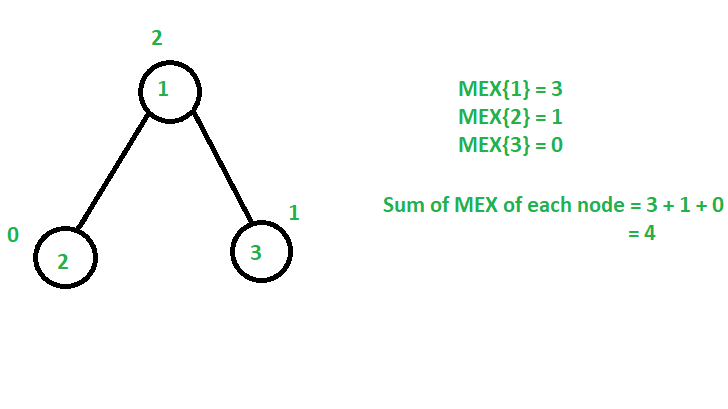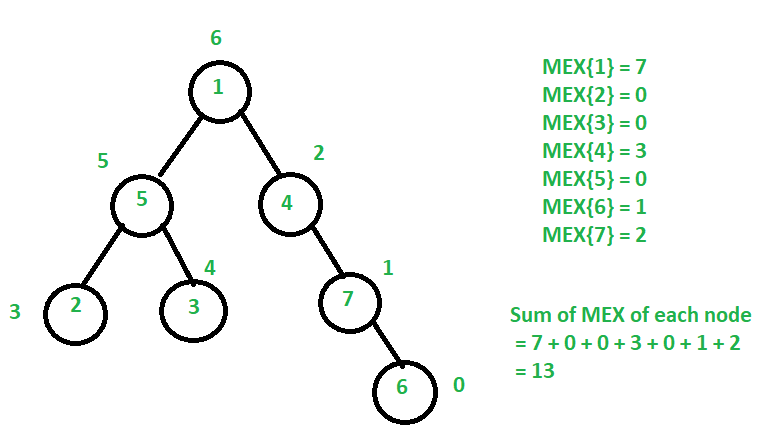给定一棵 N 叉树 以1为根,任务是以任何顺序将[0, N – 1]范围内的值分配给每个节点,以使树中每个节点的 MEX 值总和最大化并打印MEX值的最大可能总和树中的每个节点。
The MEX value of node V is defined as the smallest missing positive number in a tree rooted at node V.
例子:
Input: N = 3, Edges[] = {{1, 2}, {1, 3}}
Output: 4
Explanation:

Assign value 0 to node 2, 1 to node 3 and 2 to node 1.
Therefore, the maximum sum of MEX of all nodes = MEX{1} + MEX{2} + MEX{3} = 3 + 1 + 0 = 4.
Input: N = 7, Edges[] = {1, 5}, {1, 4}, {5, 2}, {5, 3}, {4, 7}, {7, 6}}
Output: 13
Explanation:

Assign value 0 to node 6, 1 to node 7, 2 to node 4, 6 to node 1, 5 to node 5, 3 to node 2 and 4 to node 3.
Therefore, the maximum sum of MEX of all nodes = MEX{1} + MEX{2} + MEX{3} + MEX{4} + MEX{5} + MEX{6} + MEX{7} = 7 + 0 + 0 + 3 + 0 + 1 + 0 = 13.
方法:想法是对给定的 N 叉树执行 DFS 遍历,并找到树中每个子树的MEX和。请按照以下步骤解决问题:
- 对以节点 1 为根的树执行深度优先搜索(DFS)。
- 用0初始化变量mex ,用1初始化大小。
- 遍历当前节点的所有子节点并执行以下操作:
- 递归调用当前节点的子节点,并将所有子树中 MEX 的最大和存储在mex 中。
- 增加以当前节点为根的树的大小。
- 按大小增加mex的值。
- 完成以上步骤后,打印mex的值作为答案。
下面是上述方法的实现:
C++
// C++ program for the above approach
#include
using namespace std;
// Function to create an N-ary Tree
void makeTree(vector tree[],
pair edges[],
int N)
{
// Traverse the edges
for (int i = 0; i < N - 1; i++) {
int u = edges[i].first;
int v = edges[i].second;
// Add edges
tree[u].push_back(v);
}
}
// Function to get the maximum sum
// of MEX values of tree rooted at 1
pair dfs(int node,
vector tree[])
{
// Initialize mex
int mex = 0;
int size = 1;
// Iterate through all children
// of node
for (int u : tree[node]) {
// Recursively find maximum sum
// of MEX values of each node
// in tree rooted at u
pair temp = dfs(u, tree);
// Store the maximum sum of MEX
// of among all subtrees
mex = max(mex, temp.first);
// Increase the size of tree
// rooted at current node
size += temp.second;
}
// Resulting MEX for the current
// node of the recursive call
return { mex + size, size };
}
// Driver Code
int main()
{
// Given N nodes
int N = 7;
// Given N-1 edges
pair edges[]
= { { 1, 4 }, { 1, 5 }, { 5, 2 }, { 5, 3 }, { 4, 7 }, { 7, 6 } };
// Stores the tree
vector tree[N + 1];
// Generates the tree
makeTree(tree, edges, N);
// Returns maximum sum of MEX
// values of each node
cout << dfs(1, tree).first;
return 0;
} Java
// Java program for the above approach
import java.util.*;
class GFG{
static class pair
{
int first, second;
public pair(int first, int second)
{
this.first = first;
this.second = second;
}
}
// Function to create an N-ary Tree
static void makeTree(Vector tree[],
pair edges[], int N)
{
// Traverse the edges
for(int i = 0; i < N - 1; i++)
{
int u = edges[i].first;
int v = edges[i].second;
// Add edges
tree[u].add(v);
}
}
// Function to get the maximum sum
// of MEX values of tree rooted at 1
static pair dfs(int node, Vector tree[])
{
// Initialize mex
int mex = 0;
int size = 1;
// Iterate through all children
// of node
for(int u : tree[node])
{
// Recursively find maximum sum
// of MEX values of each node
// in tree rooted at u
pair temp = dfs(u, tree);
// Store the maximum sum of MEX
// of among all subtrees
mex = Math.max(mex, temp.first);
// Increase the size of tree
// rooted at current node
size += temp.second;
}
// Resulting MEX for the current
// node of the recursive call
return new pair(mex + size, size);
}
// Driver Code
public static void main(String[] args)
{
// Given N nodes
int N = 7;
// Given N-1 edges
pair edges[] = { new pair(1, 4),
new pair(1, 5),
new pair(5, 2),
new pair(5, 3),
new pair(4, 7),
new pair(7, 6) };
// Stores the tree
@SuppressWarnings("unchecked")
Vector[] tree = new Vector[N + 1];
for(int i = 0; i < tree.length; i++)
tree[i] = new Vector();
// Generates the tree
makeTree(tree, edges, N);
// Returns maximum sum of MEX
// values of each node
System.out.print((dfs(1, tree).first));
}
}
// This code is contributed by Princi Singh Python3
# Python3 program for the above approach
# Function to create an N-ary Tree
def makeTree(tree, edges, N):
# Traverse the edges
for i in range(N - 1):
u = edges[i][0]
v = edges[i][1]
# Add edges
tree[u].append(v)
return tree
# Function to get the maximum sum
# of MEX values of tree rooted at 1
def dfs(node, tree):
# Initialize mex
mex = 0
size = 1
# Iterate through all children
# of node
for u in tree[node]:
# Recursively find maximum sum
# of MEX values of each node
# in tree rooted at u
temp = dfs(u, tree)
# Store the maximum sum of MEX
# of among all subtrees
mex = max(mex, temp[0])
# Increase the size of tree
# rooted at current node
size += temp[1]
# Resulting MEX for the current
# node of the recursive call
return [mex + size, size]
# Driver Code
if __name__ == '__main__':
# Given N nodes
N = 7
# Given N-1 edges
edges = [ [ 1, 4 ], [ 1, 5 ],
[ 5, 2 ], [ 5, 3 ],
[ 4, 7 ], [ 7, 6 ] ]
# Stores the tree
tree = [[] for i in range(N + 1)]
# Generates the tree
tree = makeTree(tree, edges, N)
# Returns maximum sum of MEX
# values of each node
print(dfs(1, tree)[0])
# This code is contributed by mohit kumar 29C#
// C# program for the above approach
using System;
using System.Collections.Generic;
class GFG{
public class pair
{
public int first, second;
public pair(int first, int second)
{
this.first = first;
this.second = second;
}
}
// Function to create an N-ary Tree
static void makeTree(List []tree,
pair []edges, int N)
{
// Traverse the edges
for(int i = 0; i < N - 1; i++)
{
int u = edges[i].first;
int v = edges[i].second;
// Add edges
tree[u].Add(v);
}
}
// Function to get the maximum sum
// of MEX values of tree rooted at 1
static pair dfs(int node, List []tree)
{
// Initialize mex
int mex = 0;
int size = 1;
// Iterate through all children
// of node
foreach(int u in tree[node])
{
// Recursively find maximum sum
// of MEX values of each node
// in tree rooted at u
pair temp = dfs(u, tree);
// Store the maximum sum of MEX
// of among all subtrees
mex = Math.Max(mex, temp.first);
// Increase the size of tree
// rooted at current node
size += temp.second;
}
// Resulting MEX for the current
// node of the recursive call
return new pair(mex + size, size);
}
// Driver Code
public static void Main(String[] args)
{
// Given N nodes
int N = 7;
// Given N-1 edges
pair []edges = { new pair(1, 4),
new pair(1, 5),
new pair(5, 2),
new pair(5, 3),
new pair(4, 7),
new pair(7, 6) };
// Stores the tree
List[] tree = new List[N + 1];
for(int i = 0; i < tree.Length; i++)
tree[i] = new List();
// Generates the tree
makeTree(tree, edges, N);
// Returns maximum sum of MEX
// values of each node
Console.Write((dfs(1, tree).first));
}
}
// This code is contributed by Amit Katiyar Javascript
13时间复杂度: O(N)
辅助空间: O(1)
如果您想与行业专家一起参加直播课程,请参阅Geeks Classes Live